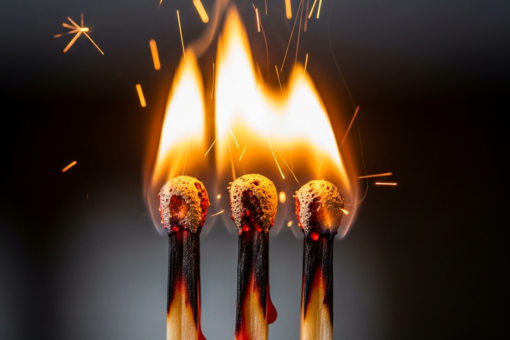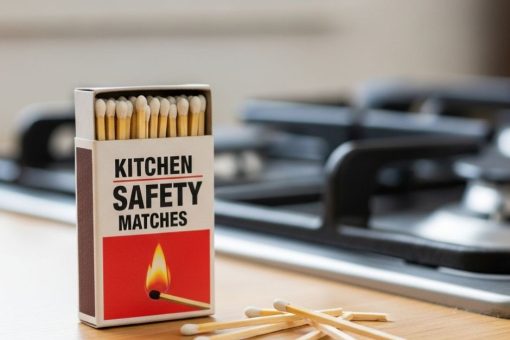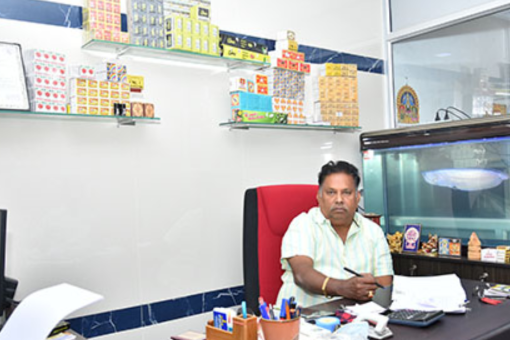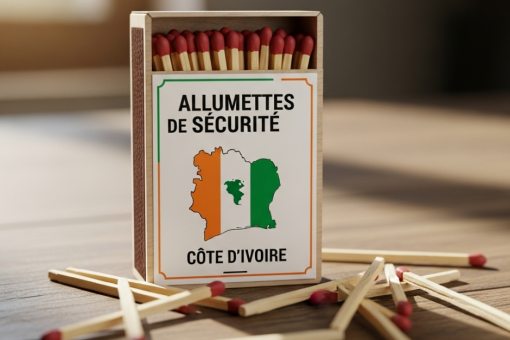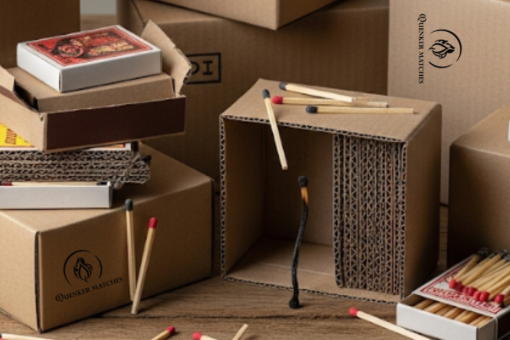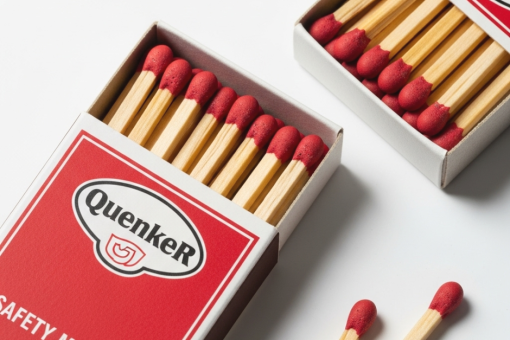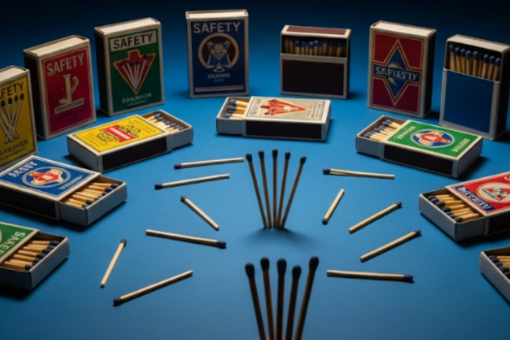Safety matches may be small, but their global demand is massive. From lighting candles in homes to sparking flames in industrial and hospitality settings, these matchboxes are essential across many regions. In this blog, we explore the Top 12 leading countries that import safety matches in bulk. Whether you’re a wholesale matchbox supplier or an exporter, this list offers valuable insights into where global demand is strongest and why these countries are at the forefront of the safety match import market.
Global Safety Matches Import Market
The global safety match industry has witnessed remarkable growth, with the market valued at approximately $4.6 billion in 2023 and projected to reach $6.7 billion by 2033, reflecting a compound annual growth rate (CAGR) of 4.0%.
According to the latest Volza trade statistics, Nigeria leads as the world’s largest safety match importer, accounting for 17% of global imports with 472 shipments, while the United States dominates in terms of shipment volume with 7,264 shipments, followed by Nigeria with 3,179 shipments and France with 2,590 shipments.
Top 12 Countries Import Matchboxes
Rank
Country
Key Reasons for Import
Primary Exporting Country
Major Part of Entry
1
Nigeria
Large population, rural cooking
India
Lagos
2
United States
Emergency kits, hospitality branding
India, China
Los Angeles
3
South Africa
Low-income households, camping, traditional fire-starting
India
Durban
4
United Kingdom
Hospitality, survival/outdoor segment
India, Sweden
London
5
Germany
Luxury branding items
India
Hamburg
6
France
Design-forward, promotional giveaways, limited domestic output
India
Marseille
7
Canada
Outdoor camping, cold weather utility
India
Toronto
8
United Arab Emirates
Ethnic demand, re-export hub, hospitality sector
India
Dubai
9
Yemen
Essential fire source, limited production
India
Aden
10
Zambia
Rural usage, cost-effective fire source
India
Lusaka
11
Peru
Household cooking, rural regions, limited lighter use
India, China
Callao
12
Togo
Low-cost fire solution, informal economy
India
Lomé
1. Nigeria: World’s Top Importer of Safety Matches
Nigeria stands as the continental leader in safety match imports, with estimated imports exceeding 1.2 billion matchboxes in 2025. This massive demand stems from Nigeria’s population of over 223 million and a vast informal economy where reliable fire-starting tools are essential for households and small businesses.
Who buys safety matches in Nigeria?
Distributors and wholesalers supplying local stores and open markets
Retail chains and supermarkets looking for reliable branded stock
Religious institutions for ceremonial use
Hotels, restaurants, and street food vendors needing consistent lighting tools
Which brands of safety matches are popular in Nigeria?
Nigerian buyers often look for trusted export brands from India, such as those offering cardboard matches, wax matches, and wooden matches with customizable box sizes (20s, 40s, 50s). High-friction, long-burning sticks are particularly in demand.
Why is demand for safety matches growing in Nigeria?
Frequent power outages increase dependency on candles and kerosene stoves
Rural cooking habits still prefer fire-based ignition
Low-cost and essential household use make it a daily commodity
Rise in micro-businesses such as roadside tea stalls, grilled meat vendors, etc.
📊 SAFETY MATCHES MARKET SCORECARD
Import Volume: 1.2+ BILLION matchboxes annually
Profit Rating: ⭐⭐⭐⭐⭐ (EXCELLENT)
Payment Terms: L/C, 30-60 days
Entry Difficulty: Easy
MOST COMMON SAFETY MATCH SPECIFICATION
Popular Size: 40-50 sticks per matchbox
Carton Configuration: 10 x 10 x 10 = 1,000 pieces per carton
Wholesale Price: $12-18 per carton (1,000 pieces)
Container Capacity: 1,900 cartons per 20ft container, 4,200 cartons per 40ft HQ container
Why Nigeria Prefers Indian Safety Match Exporters
Nigeria’s unmatched demand for safety matches is driven by daily usage across millions of households and small businesses.
India is the #1 exporter to Nigeria, holding over 65–70% market share in safety match imports.
Major manufacturing hubs: Kovilpatti and Sivakasi, Tamil Nadu
Flexible MOQs and 20ft/40ft HQ container loads suited to varying needs
Known for cost-effective production, custom branding, and consistent supply volumes
2. United States: Leading Matchbox Importer by Volume
The United States maintains its position as the world’s largest safety match importer by shipment volume, with 7,264 shipments recorded in recent trade data.
Metric
Details
Rank in Imports
#2 globally (by shipment volume)
Estimated Imports
7,000+ recorded shipments annually
Major Entry Ports
Los Angeles, New York, Houston
Top Exporting Countries
India, China
End Users
Retailers, supermarkets, survival stores
Compliance Required
CPSIA, ASTM D6196, labeling & fire safety
Who Uses Safety Matches in United States?
Safety matches in the United States are used across various sectors:
Retail Chains (for household use)
Hotels & Restaurants (custom-branded matchbooks)
Emergency & Outdoor Kits (weatherproof safety matches)
Event Planners (as promotional items or collectibles)
Distributors & E-commerce Sellers (buying in bulk for resale)
Are Safety Matches Legal in the U.S.?
Yes. But the matches must meet:
CPSC Safety Standards (Child-resistant packaging if needed)
Flammability & Labeling Regulations
State Fire Codes (especially for commercial/resale purposes)
If you are importing safety matches into the United States, ensure your supplier provides:
MSDS (Material Safety Data Sheet)
Proper HS Code classification
Packaging and labeling per U.S. customs
In the United states, safety matches must comply with federal safety regulations and are commonly labeled as “strike-on-box” matches.
3. South Africa: Wholesale Matchbox Buyers
South Africa serves as a crucial regional distribution center for safety matches across Southern Africa. The country’s well-developed infrastructure and strategic location make it an ideal hub for receiving bulk imports of safety matches and redistributing them throughout the region.
Important Market Facts
Estimated Imports (2025): Nearly 700 million matchboxes
Main Import Sources: India, China, Indonesia
Distribution Channels: Container traders, rural wholesalers, spaza shops, hardware stores
Even as gas and electric alternatives become more popular in cities like Johannesburg and Cape Town, lower-income neighborhoods and townships still rely heavily on safety matches for cooking, lighting, and resale. Matchboxes are also vital for resale microbusinesses operating in informal markets.
📊Stats to Know
Over 50% of imported matchboxes are distributed through wholesale channels serving informal markets.
Match imports have grown 1.5x since 2020, tied to domestic fuel price volatility and rising rural consumption.
Indian brands dominate because of customizable branding, moisture-resistant coatings, and container-load availability.
4. United Kingdom: Bulk Buyer of Safety Matches
The United Kingdom maintains steady safety match imports, serving both domestic consumption and European distribution networks. British consumers demonstrate preference for high-quality, long-burning safety matches, particularly for luxury applications like candle lighting and fireplace use.
Popular Safety Matches Specification
Premium Quality: 30-40 long-burning sticks per box
Luxury Pricing: $35-55 per carton for premium matches
Eco-Friendly Options: Sustainable wood and cardboard packaging
Regulatory Compliance: CE marking and British safety standards
Safety Matches in United Kingdom
The United Kingdom has consistently been a leading importer and bulk buyer of safety matches due to several industry needs:
Sustainable packaging trends: UK consumers increasingly prefer wooden safety matches with recyclable or FSC-certified boxes.
Hospitality sector demand: Hotels, pubs, and restaurants often customize matchboxes for branding and guest use.
Home fragrance & luxury brands: Many candle and incense makers use long-stem or extra-long safety matches for aesthetic and safety value.
Regulatory compliance: Safety matches comply with UK fire safety and import norms, unlike other ignition options.
5. Germany: Match box Importers from India
Germany may not top the list in volume, but it leads in precision-driven demand. The country imports 180–200 million matchboxes annually, with the majority sourced from India, Poland, and Sweden. Key ports like Hamburg, Bremen, and Frankfurt handle most of the inflows.
Top Sourcing Countries:
India – Known for low-cost high-volume options
Poland – Preferred for proximity and EU standards
Sweden – Supplies eco-certified wooden matches
Why Safety Matches Matter in German Industry
Unlike consumer-heavy markets, Germany’s match imports primarily support industrial and technical uses:
Welding & metal fabrication (for pilot ignition)
Scientific laboratories (controlled ignition)
Survival and field kits (military-grade waterproof matches)
Testing environments (flame retardant assessments)
6. France – Premium Market for Safety Match Exporters
France represents a sophisticated market with 2,590 shipments recorded in recent trade data. French consumers demonstrate strong preference for premium-quality matches, particularly for culinary applications and luxury home use. The market shows interesting segmentation between everyday utility matches and specialized products for specific uses.
The below tabular breakdown of France’s top 5 safety match supplier countries, showing each country’s market share in France’s imports and the type of match products they typically export to the French market.
Rank
Country
% Share of France’s Imports
Product Type
1
India
34%
Luxury & general utility matches
2
Sweden
27%
Eco-labeled matches, FSC certified
3
Germany
14%
Candle-lighting, designer matchsticks
4
Indonesia
11%
Moisture-resistant kitchen matches
5
Vietnam
6%
Long-stem matches for home decor
7. Safety Matches in Canada
Canada’s safety match imports serve both domestic consumption and cross-border trade dynamics with the United States. The country’s vast rural areas and outdoor recreation culture drive consistent demand for reliable fire-starting solutions. Canadian winters particularly boost demand for emergency preparedness supplies, including safety matches.
Safety Matches Import Market Analysis
Recent data shows 38,000 Import shipments, involving 5,261 Buyers and 1,566 Suppliers, with direct contact information of Decision Makers. Canada imports significant quantities to meet domestic demand and cross-border distribution
Key Import Characteristics
Primary Sources: Asian manufacturers (India)
Packaging: Usually packed in bulk match cartons, often in 400 to 600 carton batches, depending on the buyer’s order size. The packaging is designed to be moisture-resistant and comply with international shipping norms
Seasonal Patterns: Increased imports before winter months and camping season
Strategic Location Benefits
Cross-Border Access: Easy distribution to US markets
Port Infrastructure: Major ports in Vancouver, Montreal, Halifax
Transportation Networks: Efficient rail and trucking connections
Regulatory Alignment: Compatible safety standards with US market
8. United Arab Emirates: Safety Matches Market
The United Arab Emirates serves as the premier distribution hub for safety matches and matchboxes in the Middle East, North Africa, and South Asia (MENASA) region. With Dubai and other emirates acting as strategic gateways, the UAE facilitates both domestic consumption of safety matches and extensive re-export activities of matchboxes across regional markets, leveraging world-class infrastructure and business-friendly trade policies.
UAE Safety Match Trade Position
Regional Gateway: UAE serves as the primary entry point for safety matches into the GCC region
Import-Export Hub: Balances domestic matchbox consumption with significant re-export volumes
Quality Standards: Maintains high safety match quality standards for both local and regional markets
Re-Export Hub for Safety Matches
Regional Distribution Network
GCC Countries: Saudi Arabia, Kuwait, Qatar, Oman, Bahrain
South Asian Markets: Re-export to Pakistan, Bangladesh, Sri Lanka
North African Routes: Distribution to Egypt, Sudan, Libya
East African Markets: Kenya, Tanzania, Uganda, Ethiopia
Trade Statistics and Matchbox Patterns 📈
Safety Match Category
Annual Volume (Est.)
Growth Rate
Key Suppliers
Cardboard Safety Matches
2.5M boxes
12%
India, Pakistan
Kitchen Safety Matches
1.8M boxes
15%
India, China
Wax Safety Matches
800K boxes
18%
India, Sweden
Promotional Matchboxes
1.2M boxes
25%
India, China
Long stick Safety Matches
600K boxes
10%
India, Pakistan
With proper market entry strategies and compliance with local regulations, the UAE safety match market presents significant opportunities for importers, distributors, and manufacturers seeking to establish or expand their presence in the Middle East and broader MENASA region’s safety match industry.
Looking to Import Personalized or Custom Matchboxes? Get a quote from Quenker Matches today!
9. Safety Matches in Yemen
Despite challenging economic conditions, Yemen maintains significant safety match imports due to widespread reliance on traditional cooking methods and limited access to modern alternatives. The market primarily focuses on affordable, basic-quality matches suitable for everyday household use.
Why Yemen Imports Safety Matches
1. Lack of Local Manufacturing
Does not have large-scale matchstick manufacturing facilities.
The industrial infrastructure is minimal due to ongoing conflict and economic instability.
High costs and risks make it unattractive for local investors to set up match production plants.
2. Steady Domestic Demand
Despite challenges, Yemen’s population of over 33 million relies on basic fire-starting tools.
3. Low-Cost Imports Are Preferred
Importing from cost-efficient countries like India, Indonesia, and Sri Lanka helps meet demand affordably.
These countries offer bulk packaging, custom branding, and low Minimum Order Quantities (MOQs), which Yemeni traders prefer.
10. Zambia: Leading Safety Match Importer in Southern Africa
Zambia’s safety match imports reflect the country’s developing economy and growing urban population. The market combines traditional rural demand with expanding urban applications. Zambia also serves as a distribution point for landlocked Southern African countries.
Key Market Insights:
Estimated Imports (2025): ~320 million matchboxes
Primary Export Partners: India, Kenya
Use Cases: Cooking, rural household lighting, roadside vending
11. Peru: Latin American Growth Market
Peru’s safety match imports have grown steadily, driven by economic development and urbanization. The country’s diverse geography creates varied demand patterns, from coastal urban areas to highland rural communities. Peru’s growing middle class influences demand for higher-quality match products.
The market shows increasing sophistication, with consumers seeking matches that perform well in Peru’s varied climatic conditions, from humid coastal areas to dry highland regions.
12. Togo: Safety Matches Market
Togo has positioned itself as a key importer and re-distributor of safety matches in West Africa, thanks to its strategic coastal location, active informal economy, and strong trade links with Francophone countries. While domestic production is minimal, imports from India and Sri Lanka play a crucial role in meeting household demand and fueling wholesale supply chains across Burkina Faso, Benin, Niger, and beyond. Togo’s port in Lomé acts as a vital transshipment hub for matchbox distribution in the region.
Key Insights:
Estimated Imports (2025): 200–250 million matchboxes
Primary Sources: India, Sri Lanka
Use Cases: Household cooking, roadside vendors, rural lighting
Distribution: Informal markets, border trade, wholesale depots near Lomé
Emerging Trend: Bulk imports by regional distributors serving Francophone West Africa
Why These Markets Matter for Safety Match Exporters
India is a top producer and exporter
Demand is rising in Middle East & Africa
Private labeling is driving bulk orders
Re-export hubs (like UAE) create regional trade loops
Conclusion
As global demand continues to rise projected to cross $6.7 billion by 2033—now is the time for safety matches manufacturers and suppliers to ignite new trade routes, adapt to market-specific needs, and spark success in the evolving safety match import landscape.
Exporters looking to grow in global markets must monitor where to import safety matches efficiently. With strong demand in Africa, the Middle East, and Europe, these 12 countries offer a roadmap for growth.
Want to export to these top countries? Contact Quenker Matches for custom matchbox solutions, private labels, and bulk-ready shipping support.
FAQ’s
1. Who are the top safety matches importing countries?
Countries like Nigeria, UAE, France, UK, Germany, and Yemen lead global imports due to high domestic demand and limited local production.
2. Which country is the biggest exporter of safety matches?
India dominates as a global exporter due to its low-cost production and consistent supply quality.
3. How do Safety match importers choose their suppliers?
They assess quality, pricing, certifications, delivery capacity, and supplier reputation before signing contracts.
4. Who is the leading safety match exporter globally?
Quenker Matches is a trusted leader in safety match exports, known for quality, reliability, and global reach.
